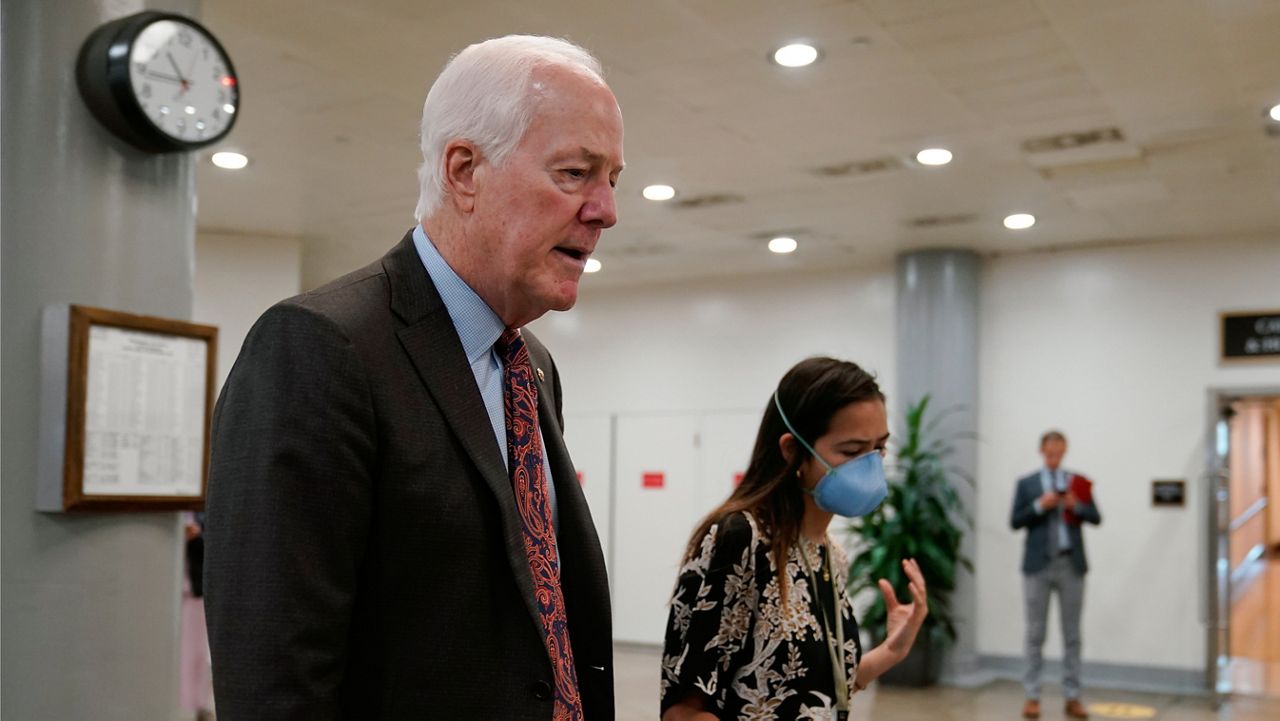On Wednesday, Texas Sen. John Cornyn, the lead Republican architect of the bipartisan gun safety bill framework, expressed concerns about two of the bill’s key provisions — but Democratic negotiators are optimistic those issues can be resolved.
A group of 10 Democrats and 10 Republicans over the weekend announced an agreement on a framework to respond to recent mass shootings in Uvalde, Texas, and Buffalo, New York. The framework has the endorsement of the Biden administration as well as the Senate leaders of both parties, but legislative text has not yet been written for the measure.
Cornyn told reporters that a group of negotiators will be meeting again Wednesday as they attempt to iron out issues and draft final legislative text, but the Texas Republican said he was “a little concerned” that outstanding issues related to funding for so-called “red flag” laws and closing the “boyfriend loophole” could delay those efforts.
“I'm starting to get a little concerned, though, that there are a couple of issues that need to be settled before we can reach an agreement,” he told reporters. “One of the issues … is whether the funds that we will vote for will be available to states that don't have red flag laws, but do have crisis intervention programs and things like mental health courts, veterans courts, assisted outpatient treatment programs.”
“I just don't think anything that funds 19 states for their programs but ignores other states that have chosen not to have a red flag law but rather have other ways to address the same problem is going to fly,” Cornyn continued.
A Red flag law, also known as an Extreme Risk Protection Order (ERPO), is a gun safety measure which allows police, family members or other individuals to seek a court order to allow authorities to remove firearms from those considered to be a danger to themself or others.
The bipartisan framework would provide funding for states to implement their own ERPO statutes, but, as Cornyn emphasized in a floor speech on Tuesday, “none of what we are proposing would create a national red flag law.”
Still, the red flag provision in the bipartisan framework has emerged as a sticking point among some Republican lawmakers.
Senate Minority Whip John Thune, R-S.D., told CNN that “the red flag laws that have been implemented in some states” have seen some successes, while in other states “there are real concerns about due process.”
“I think we're more interested in the red wave than we are in red flags, quite honestly,” Sen. Kevin Cramer, R-N.D., told reporters on Tuesday after a Republican caucus briefing on the bipartisan framework.
But Louisiana Sen. Bill Cassidy, one of the Republicans who backs the bipartisan framework, said that their framework will “mandate” due process, citing red flag laws in Republican-led states like Indiana and Florida.
“I think as people become acquainted with that, Republicans will like that,” he said.
In an interview with CNN on Wednesday, Connecticut Sen. Chris Murphy, the lead Democratic negotiator on the agreement, said that the measure is going to contain “a lot of money for law enforcement, schools and mental health.”
“All of that money will be eligible for states, whether they pass red flag laws or not,” he pledged, adding that there is a “specific incentive fund … for states that do choose to pass red flag laws.”
The other issue, Cornyn said, relates to the “boyfriend loophole,” a provision which would address a gap in federal law which bars domestic abusers who are married to, have lived with or have a child with the victim from having guns, but does not prohibit dating partners from having firearms.
“The other issue has to do with the way that nontraditional relationships are handled in terms of domestic violence and misdemeanors,” Cornyn told reporters. “We have got to come up with a good definition of what that actually means.”
“It's got to be clear and it's got to be something that can be actually applied because we're talking about pretty serious consequences,” he added.
Cornyn warned that “if we can’t get to 60” votes, referring to the figure needed to overcome the legislative filibuster threshold in the Senate, “we're going to have to pare some of this down.”
“I don't think we're at that point yet,” Cornyn noted, saying that “if we can settle these two issues, I think we're on our way,” but expressed concerns about the timing needed to reach an accord — Murphy told CNN on Wednesday that they hope to finalize the legislation and hold a vote before the July Fourth recess.
Despite the concerns raised by Republicans, Democratic lawmakers say they are confident that the issues will be resolved.
“There's lots of pressures, pro and con,” Delaware Sen. Chris Coons told reporters. "There are some details to work out but I remain very optimistic that we'll get a bill together and get it to the floor.”
“The problems and issues are fixable,” Connecticut Sen. Richard Blumenthal said. “The timeline is tight, but it is achievable. And we're working literally dusk to dawn and past dusk to achieve resolutions.”



